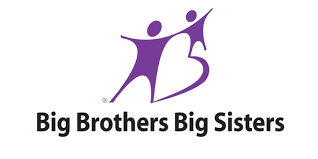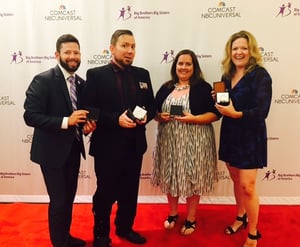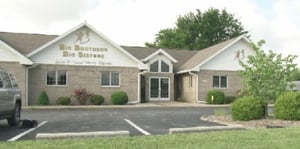
-
What Do We Do?
-
Resources
-
Events
-
Coaching
- Training


Learn from the "Best of the Best" - the Great Game™ All-Stars

Location: Springfield, Mo
2015 Revenue:
$1 million
Employees: 14
Big Brothers Big Sisters of the Ozarks (BBBSO) operates under the belief that every child has the inherent ability to succeed and thrive in life. Big Brothers Big Sisters, which started in 1904, is the largest donor and volunteer supported one-to-one mentoring network nationwide.
BBBSO has been named one of the top 16 agencies out of over 307 agencies nationwide. The organization served some 600 children last year. In July of 2016, BBBSO was named Agency of the Year at their national conference.

The Problem
Find ways to engage employees in the organization’s mission and get everyone working together.
The Solution
Use open-book management to create shared goals between the fund-raising side of the organization and the program side charged with matching up adults (Bigs) with kids in need of mentors (Littles).
The Results
After fully implementing the Great Game of Business in January of 2015, BBBSO raised over $1 million dollars (a 22% increase in revenue) and created 17% more life-changing friendships between Bigs with Littles.
 Following in the footsteps of other Pioneer Award winning organizations like Greene County Missouri, BBBSO, like so many other organizations in Springfield, learned about the Great Game of Business from members of the SRC family, including Tim Stack, the president of SRC Electrical, who served on the organization’s board.
Following in the footsteps of other Pioneer Award winning organizations like Greene County Missouri, BBBSO, like so many other organizations in Springfield, learned about the Great Game of Business from members of the SRC family, including Tim Stack, the president of SRC Electrical, who served on the organization’s board.
The more Katie Davis, the CEO of BBBSO, learned about open-book management, the more intrigued she became about how it could help her team address issues ranging from cutting expenses to raising more donations and making more matches.
"We have been working really hard and looking at the numbers to try and figure out not only how we can serve more kids, but more importantly, how can we serve the kids with higher quality," says Davis.
Implementing open-book management and financial literacy training has had an enormous impact on BBBSO – especially because they are a non-profit organization. “Our staff, donors, board members, and volunteers all have access to all of our critical numbers at any given time,” says Davis. “The numbers are literally written on our walls. By providing access to the numbers and teaching those involved what the numbers mean we have been able to maximize employee engagement, board engagement, and donor engagement. This increased engagement has been a critical component of our rapid growth.”
That engagement also led to reduced expenses, says Davis, where her associates began to pay more attention to costs like mileage allowances and office supplies. The team has also run a series of mini-games designed to help further drive fundraising and matches made.
Those changes, in turn, helped the organization reach its goals built around its critical number, net income, which, combined with goals set on the number of matches made, allowed the organization to exceed its budgeted goals and pay each associate a bonus, which they call a “growth incentive.” “We had a wonderful celebration where each staff member was personally recognized and given their growth incentive check,” says Davis. “Our board members attended too and were part of the celebration, which made it even more special.”
One key ingredient to the BBBSO’s success is that they become extremely proficient in monitoring cash flow projections. “We pride ourselves in treating our agency with the same knowledge, responsibility, and business acumen that you would find in any for-profit company,” says Davis.
Every staff member is responsible for weekly projections of revenue and expenses. The staff then meets every week to analyze the numbers and project where they will be at the end of the month based on historical knowledge, current conditions, and aging accounts receivable. The team also reviews the actuals as a staff and compares them with their projections from the prior month. All of the numbers are kept up to date on a scoreboard mounted in a conference room, which enables every staff member, donor, volunteer, or board member to see how much cash is coming into and out of organization at any given time. Anyone that walks in the room can also see at a glance the numbers of matches made, number of volunteer inquiries, and other critical program related metrics.
The success that BBBSO has had with open-book management has created a substantial amount of interest from other non-profit organizations interested in creating the same level of impact.
Download a printable version of this case study
Interested in seeing how The Game could work in your not-for-profit organization?
Check out Great Game for Social Sectors!
Terms and Conditions | Privacy Policy
All trademarks, trade names or logos mentioned or used herein are the property of their respective owners. Reference to any product or service by manufacturer, trade name, trademark or otherwise does not reflect any affiliation with the manufacturer or its endorsement of the products or services. | COPYRIGHT © 2019 THE GREAT GAME OF BUSINESS, INC. All rights reserved.
For over 40 years, The Great Game of Business™ has helped organizations reach their highest potential and value.
Tapping into the universal human need to win, GGOB educates your people in the rules of business, rallies them around a common goal, empowers them to see and improve the score, and engages them by giving them a stake in the outcome.
2401 E. Sunshine St.
Springfield, MO 65804